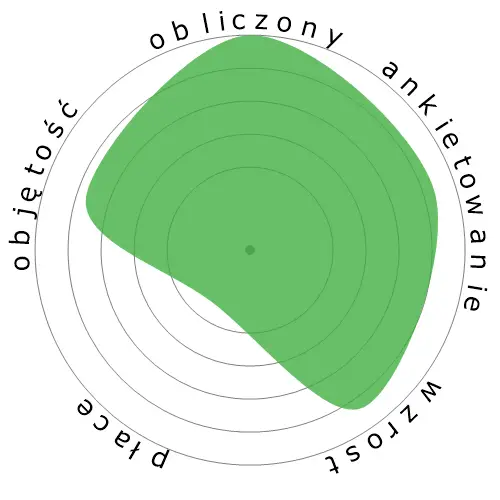Doradcy ds. zdrowia psychicznego
Dane zatrudnienia nie są dostępne specjalnie dla tego zawodu z Biura Statystyki Pracy, więc korzystamy z danych z Substance Abuse, Behavioral Disorder, and Mental Health Counselors.




Ludzie również oglądali
Obliczone ryzyko automatyzacji
Minimalne ryzyko (0-20%): Zawody w tej kategorii mają niskie prawdopodobieństwo automatyzacji, ponieważ zazwyczaj wymagają one skomplikowanego rozwiązywania problemów, kreatywności, silnych umiejętności interpersonalnych oraz wysokiej sprawności manualnej. Te prace często wiążą się z złożonymi ruchami rąk i precyzyjną koordynacją, co utrudnia maszynom naśladowanie wymaganych zadań.
Więcej informacji na temat tego, czym jest ten wynik i jak jest obliczany, jest dostępne tutaj.
Ankieta użytkownika
Nasi goście zagłosowali, że jest małe prawdopodobieństwo, iż ten zawód zostanie zautomatyzowany. To ocena jest dodatkowo wspierana przez obliczony poziom ryzyka automatyzacji, który szacuje 0,0% szansę na automatyzację.
Jakie są Twoje zdanie na temat ryzyka automatyzacji?
Jakie jest prawdopodobieństwo, że Doradcy ds. zdrowia psychicznego zostanie zastąpione przez roboty lub sztuczną inteligencję w ciągu najbliższych 20 lat?
Nastroje
Poniższy wykres jest zamieszczany wszędzie tam, gdzie istnieje znaczna liczba głosów, aby przedstawić istotne dane. Te wizualne reprezentacje pokazują wyniki ankiet użytkowników w czasie, dostarczając istotnych wskazówek dotyczących trendów nastrojów.
Nastroje w czasie (rocznie)
Wzrost
Liczba ofert pracy na stanowisku 'Substance Abuse, Behavioral Disorder, and Mental Health Counselors' ma wzrosnąć 18,8% do 2033
Zaktualizowane prognozy mają być dostępne 09-2025.
Płace
W 2023, mediana rocznej pensji dla 'Substance Abuse, Behavioral Disorder, and Mental Health Counselors' wynosiła 53 710 $, czyli 25 $ za godzinę.
'Substance Abuse, Behavioral Disorder, and Mental Health Counselors' otrzymali wynagrodzenie wyższe o 11,8% od średniej krajowej, która wynosiła 48 060 $
Objętość
Od 2023 roku zatrudnionych było 397 880 osób na stanowisku 'Substance Abuse, Behavioral Disorder, and Mental Health Counselors' w Stanach Zjednoczonych.
To oznacza około 0,26% zatrudnionej siły roboczej w całym kraju.
Inaczej mówiąc, około 1 na 381 osób jest zatrudnionych jako 'Substance Abuse, Behavioral Disorder, and Mental Health Counselors'.
Opis stanowiska pracy
Doradzanie i udzielanie porad osobom indywidualnym i grupom w celu promowania optymalnego zdrowia psychicznego, ze szczególnym naciskiem na profilaktykę. Może pomóc osobom indywidualnym radzić sobie z szerokim zakresem problemów zdrowia psychicznego, takich jak te związane z uzależnieniami i nadużywaniem substancji; problemy rodzinne, z wychowaniem dzieci i problemami małżeńskimi; zarządzanie stresem; samoocena; czy starzenie się.
SOC Code: 21-1014.00


Komentarze
Leave a comment
The client also has unlimited access to a therapist that never gets fatigued or distracted. Plus, the client can have on-demand access 24/7/365, for 5 minutes or 5 hours.
Sadly, therapists will be rare, but fortunately, society will achieve greater mental health.
For people who want quick fixes, they may turn to AI for a while. But as symptoms return, they'll wise up.
What's worrisome is the monetization of AI for these purposes. Research into AI therapy is almost entirely unethical, largely because it will be used for profit, not for people - and we all know it.
By the time people realize AI therapists are a sham, insurance companies may have long abandoned reimbursement for human therapy. We'll be too busy doomscrolling or consuming YouTube videos of kittens to do anything about it.
Eventually, when the philosophical debate about what it means to be "conscious" and "alive" starts to include AI, then it will be very interesting. However, that is likely far away.
Zostaw odpowiedź na temat tego zawodu